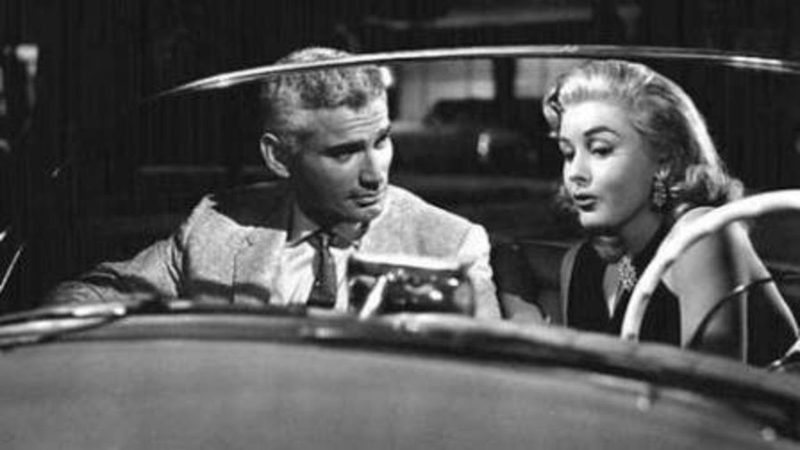




Dir: Jack Arnold | Cast: Jeff Chandler, Jack Carson, Jeanne Crain, Gail Russell | US Noir, 93′
The Tattered Dress is the second of four programmers released by Universal in 1957 directed by Jack Arnold, who had started the year extremely auspiciously with The Incredible Shrinking Man.
The 1949 outing was the first of two he made set in the deep south: the latter being Man in the Shadow, in which Jeff Chandler played the honest sheriff of a fictitious cow town called Spurline who crosses swords with a ruthless local ranch owner played by Orson Welles. In The Tattered Dress it’s the sheriff (played by Jack Carson) who’s the heavy; and Chandler is a lawyer from New York who has come to defend a wealthy spiv for the murder of a popular local sports hero to whom his trashy wife had lately taken a shine.
After a glorious opening sequence resembling a series of dime novel covers of the period, Chandler arrives in Desert View, Nevada; and the moment he steps off the train the unfriendly looks he gets tell us we’re in Mississippi Burning territory. Like most Hollywood films since time immemorial it takes a remarkably cynical view of lawyers and the law (“I could spend hours telling you of innocent men imprisoned and executed because of clumsy and uninspired defences”), but treats its often lurid subject matter in a rather lacklustre and talky fashion. Jeffrey Chandler isn’t the most convincing of casting as a cynical and ruthless lawyer whose motto is “If you’re guilty get James Gordon Blane” (it would have been perfect for Carson, actually); and most of the excellent supporting cast aren’t really at their best, with the notable exception of Edward Andrews in a very small part and Gail Russell (whose vulnerable appearance is enhanced by the regrettable fact that she was in reality drinking herself to death at the time) as a pawn in a dastardly plot by crooked sheriff Jack Carson to cook Chandler’s goose.
Two nice uses by Arnold of the Cinemascope screen were the way Chandler’s until now estranged wife Jeanne Crain signals that their conjugal relations are about to resume by firmly pulling shut the curtains in his hotel suite; and the slight but perceptible little sigh of relief visible on the part of the court stenographer (played by Robert Haines) when Chandler’s passionate summary to the jury finally ends. @Richard Chatten
NOW ON YOUTUBE